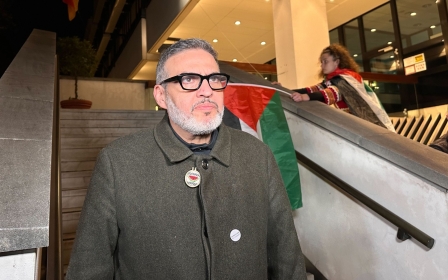Ghassan Abu Sittah: HRW calls on Germany to explain Europe travel ban on surgeon

Human Rights Watch has called on Germany to confirm whether it has imposed a year-long ban on prominent British-Palestinian surgeon Ghassan Abu Sittah from entering Europe.
In the past two weeks, Abu Sittah, who operated in Gaza during the first few weeks of the war, was barred from entering France to address the French Senate and the Netherlands.
Earlier this year, Germany also banned Abu Sittah from entering the country to speak at a Palestine solidarity conference and deported him back to the UK.
Abu Sittah's lawyers said French police told him at Charles De Gaulle airport in Paris that he was banned from entering Europe for one year because Germany placed him on the Schengen Information System (SIS) without informing him of the reason.
HRW is now calling on Germany to clarify whether it has placed Abu Sittah on the SIS and, if so, why it did do so without notifying the surgeon.
Stay informed with MEE's newsletters
Sign up to get the latest alerts, insights and analysis, starting with Turkey Unpacked
Yasmine Ahmed, UK director for Human Rights Watch, said Abu Sittah informed them that German authorities had initially refused him entry “because of the safety of the people at the conference and public order”.
“Germany can’t rely on broad exceptions to trample on rights, and HRW has written to the German government for an explanation,” Ahmed told Middle East Eye.
“Germany has an obligation not only to respect freedom of expression and peaceful association but to facilitate it. These rights can only be limited in very narrow circumstances and any limitation must be grounded in law and proportionate.”
Ahmed added that the ban imposed by Germany is a “direct attack” on Abu Sittah's right to freedom of expression and peaceful assembly.
“[This ban] also violates the rights of people across the Schengen area to hear from a witness to the unfolding events in Gaza, and may impede accountability efforts by hindering his ability to provide information to judicial authorities across Europe,” said Ahmed.
Since leaving Gaza in late November, the doctor has been raising awareness about the impact of Israel's war, which has killed more than 34,900 Palestinians.
In the initial weeks after Israel began its assault, Abu Sittah was the unofficial English-speaking representative of Palestinian doctors and surgeons treating Palestinians wounded by Israeli attacks.
He accused the Israeli military of using white phosphorus, which is illegal in built-up and populated areas like Gaza, and deliberately targeting children.
In an interview with MEE, after he left Gaza, Abu Sittah said medics were using household items to treat patients because of an Israeli-imposed blockade on medical equipment entering the enclave.
"Eventually, everything was running out. Initially, we replaced the antiseptic solution with washing-up liquid and vinegar," Abu Sittah said.
Middle East Eye delivers independent and unrivalled coverage and analysis of the Middle East, North Africa and beyond. To learn more about republishing this content and the associated fees, please fill out this form. More about MEE can be found here.




